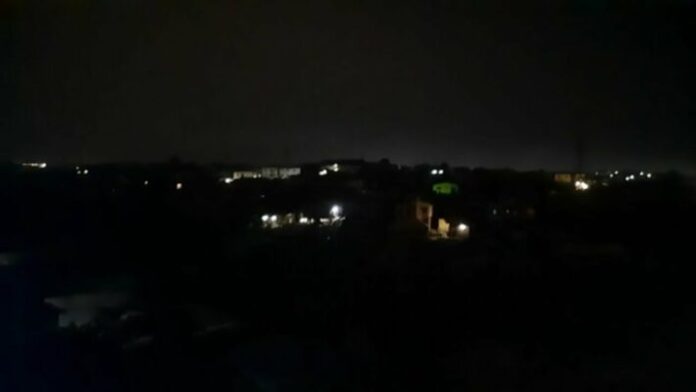Angry youths, alongside older men and women from Ndokwa communities in Delta State, took to the streets on Monday to protest more than 16 years of power outage in their area. The protesters blocked the busy Kwale axis of the Ughelli-Asaba Expressway, demanding immediate electricity supply from the Okpai Independent Power Plant (IPP) located in their region.
Chanting protest songs and carrying placards with messages such as “Light Up Ndokwa Nation” and “Electricity in Ndokwa Land: Enough is Enough; Nepa No, IPP Yes”, the demonstrators brought traffic to a standstill for several hours. Hundreds of commuters were left stranded in a long gridlock caused by the barricade.
The peaceful protest turned tense when police officers arrived at the scene around 9 a.m. and dispersed the crowd with tear gas. However, the protesters quickly regrouped and continued their demonstration.
Speaking to journalists during the protest, a youth leader identified as Mr. Enubuzor said it was frustrating that their communities had remained in darkness for over a decade while electricity generated from the Okpai IPP is supplied to other parts of the country.
“It is painful that we have something that can generate electricity for us, but we are suffering,” he said. “Our people are tired of buying fuel to power generators every day. At night, we can’t sleep because of the heat, and all we see is gas flaring from the power plant. Enough is enough.”
According to Enubuzor, the people of Ndokwa have been patient for too long and now demand that the Federal and Delta State governments take urgent steps to “step down” electricity from the Okpai plant to serve the host communities.
The Okpai IPP, located in Ndokwa East Local Government Area, is one of Nigeria’s major power generation stations, supplying electricity to the national grid and reaching over nine states. Yet, the communities surrounding the plant say they have been neglected and left in darkness.
Reacting to the protest, the Publicity Secretary of the Ndokwa Neku Union (NNU), the apex socio-cultural body of the Ndokwa people, Mr. Azuka Odainike, said the union was not opposed to the protest itself but was concerned about its timing.
He revealed that the NNU had, just a day earlier, inaugurated a standing committee to engage with government authorities on the step-down of power from the Okpai plant.
“The NNU understands the frustration of our people,” Odainike said. “But we want to ensure that there is proper engagement and dialogue. The government has already begun responding to our concerns, and we don’t want any disruption to slow that progress.”
Meanwhile, the Delta State Police Command defended its use of force to disperse the protesters. Police Public Relations Officer, SP Bright Edafe, said officers were forced to act after the protest turned violent.
“Blocking highways and burning tires is no longer peaceful protest,” Edafe said. “When protesters begin to throw stones at vehicles and create a public safety issue, we must step in.”
Despite the police action, the protest highlights growing frustration among residents in oil- and gas-producing communities who feel left out of the benefits of the natural resources extracted from their land.
The protest also reignites longstanding calls across the Niger Delta for local communities to benefit more directly from national infrastructure located in their areas.
As of the time of filing this report, normalcy had returned to the expressway, though protesters vowed to resume demonstrations if no action is taken.
Community leaders are now calling on the Federal Government, the Nigerian Electricity Regulatory Commission (NERC), and other stakeholders to intervene swiftly and bring power to Ndokwa.

